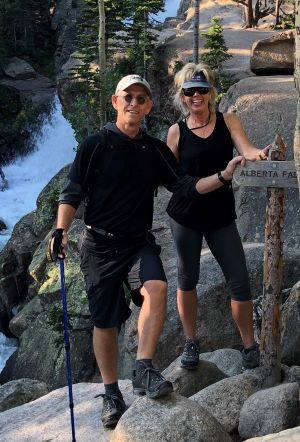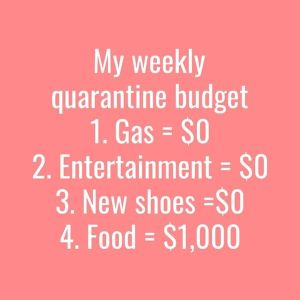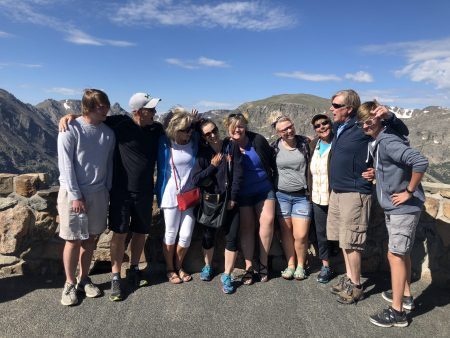COVID-19 SUCKS! But Do We See Light?
COVID-19 SUCKS! But Do We See Light?


But please indulge me as I expand on this idea.

Rebecca & I are huge fans of Rocky Mountain National Park in Colorado, and we have some hikes that we return to when we are there. One of our favorites is a 10-11 mile out and back to Black Lake. We like to give ourselves 5-6 hours to get back before the inevitable afternoon mountain thunderstorms roll in. On one occasion, while at our destination and preparing to head back down, it became evident that we would get caught in the rain. It started as a sprinkle and then became steady rain with occasional downpours. As we arrived at Mills Lake, about 2.5 miles from the trailhead, we could tell the worst of it had passed, making the last hour and a half a little easier. So, now we felt like we had pretty much survived it. But the truth was, we were still 2.5 miles out, we were soaking wet, and still encountering occasional passing showers.
Regarding COVID and how it has impacted our lives over the past 14 months, I feel like we are standing at Mills Lake. We are both fully vaccinated, neither of us got sick, we can see something that looks like the end is in sight, but know we are still a fair distance from “trailhead.” And while this is a fun analogy, getting caught in the rain isn’t the same as getting caught in a deadly, global pandemic. It’s not like we get to go home, put on some dry clothes, and it’s over. If the trailhead represents the beginnings of COVID, then the return to it will look much different than it did when the pandemic hit us.

Not unlike everyone else, Rebecca & I have had an ongoing dialogue about what all this means to us as COVID unfolded, reached its apparent crescendo, and now appears to be settling into a path toward whatever normal it will leave us. Here are some of our conclusions:
It’s crucial that we not underestimate the emotional ramifications of this past year. Uncertainty and change have resulted in varying degrees of isolation and even some anxiety. We have been fortunate enough not to lose anyone close to us from COVID but being “one-off” on several occasions, we do our best to be genuinely empathetic to those who have.
As we see things starting to open back up, we feel a little unsure how to go forward. Both our business and social practices have changed. How do we go back? What still works and what has changed forever? Sometimes we talk about the extra focus and commitment it takes to maintain the rhythm of our lives, challenged to hang onto those things fundamental to our emotional health as this pandemic has seemingly removed the spokes from our wheels.
Sometimes we have to guard against getting pissed. We’ll get pissed at the pandemic itself and then sometimes at the seeming lack of leadership from the people that were supposed to protect us. But then we have to not slip into blaming someone because it’s easy to get caught up in the public divisiveness and vitriol that comes out of fear and frustration.
Mostly, we think, we want what everyone else wants – some semblance of our lives back to what they were before this pandemic took them over. But over this past year of the COVID experience, we were forced to embrace change. Rebecca will tell you that the words graceful and change are unlikely to coexist in a description of me, and I don’t think she has anything to brag about either. Before COVID, Zoom was a verb. It was odd and uncomfortable, and if I could have resisted it any longer, I would have. And oh, those facemasks! Crazy narrative and political theater aside, damn, they’re uncomfortable and pretty dorky too. But please don’t misunderstand; we’ve stayed out of the mask debate. We will always error to the side of caution, particularly if it involves someone else’s well-being along with our own.
So, uncomfortable as it was and bullied by circumstance, we made the changes. Embracing them came next, and I think for me, that was aided by simply getting more used to some things that I would have otherwise avoided. At the same time, as these changes became more normalized, they provided an opportunity to see where some of these things began to contribute to, rather than just interfere with, our lives.

Any alternate experience offers perspective. We can also, if we choose, reflect on what this pandemic has given us. Rebecca and I have personal things that we attend to because they are essential to us and our well-being. We believe in diet, exercise, self-reflection, and meditation, all of which are easy to kick to the curb in terms of priority. We live thousands of miles away from our children, grandchildren, families, and many friends. Now that Zoom is more than a verb, we have a new venue to stay in better contact. At the same time, being (relatively) pinned down by this thing has added a new level of intimacy to many of those relationships, facilitated great conversations, and leaves us with confidence that we can stay in touch in the future.
So, it would seem, the next challenge that comes with the world starting to open back up is to shake off any remaining lethargy as we integrate back into what will be a new normal for all of us. To do our best to build on what was new and uncomfortable initially but became an asset as it became more familiar. To dial into the altruism demonstrated by many as we moved through the darkest times over the past year. To recognize that the change that will continue to come out of this is inevitable because we know some things we didn’t know before. To embrace that idea that every time we hike to Black Lake, we have a new experience that has changed our perspective of the trailhead. And then we step back into our lives, having evolved once again.



